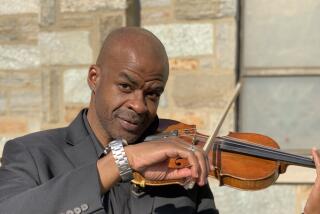SWITCHING INSTRUMENTS A BEAT PAST MIDSTREAM
- Share via
It feels like an act of treason, high foolishness and ecstatic liberation, all tumbled into one.
After more than four decades of lip service to the cornet, I have taken up the clarinet. Symbolically speaking, I have swapped the portraits on the mantlepiece of the brass men--Louis Armstrong, Bunny Berigan, Bobby Hackett, Wild Bill Davison and of course Bix Beiderbecke--for pictures of the reed players: Benny Goodman, Artie Shaw, Barney Bigard, Sidney Bechet and, naturally, the immortal Woody Allen.
I’ve always thought that writing was the most jealous, seductive, demanding and faithless mistress a man could have--leading you on, promising you glory and forever leaving you flat and winded.
But I could as well have named my King Master Model II B-flat cornet Mildred, after that wretched nurse who made life hell for the narrator of Somerset Maugham’s “Of Human Bondage.”
I mean no disrespect to the instrument, which has actually been the very model of fidelity, surviving parades, bus rides, football games, rain, sleet and hail and years of neglect, and only now beginning to grow slow in the valves.
It is just that, if I am ruthlessly truthful with myself, I see that the cornet and I were never the right match. (It was an arranged marriage; the music teacher said the band needed brass.)
The iron embouchure I dreamed of at 12, that would enable me to play loud and high and forever, never took shape, despite hours of practice. (I was an overattempter who underachieved, a truth that spilled over into my flirtations with auto mechanics and do-it-yourself generally.)
My teacher, a man in his 70s who had played with circuses, could hang his cornet on a string from a chandelier, walk up to it and blow high C and look, ma, no hands. In my prime there weren’t 30 seconds a day, on good days, when I could aspire to high C, using both hands and with the breeze behind me.
The last time I hinted of my frustrations with the cornet, I had a thoughtful and challenging letter from Bruce Hudson of Ventura County, a lifelong professional trumpet player. I had evidently neglected the prime secret of a strong lip and good sound, Hudson said, which was to blow long, sustained tones every day.
He sent a private tape he’d made with his friend, the late Gordon Jenkins, at the piano. No arabesques, just lovely melodies, played with an enviable silvery roundness. The long, sustained tone-playing had paid off and Hudson, a septuagenarian, sounded elegant.
I took out the cornet after I had his letter. The straps on the case have long since worn through and broken. The latch still holds but I’d had to replace the handle with a piece of knotted twine years ago. I tootled away to an old record but it was obvious that destiny hadn’t passed me by, it was never even in the neighborhood.
What dawned on me, slowly enough, was that I had always had a secret crush on the clarinet (and beyond it the soprano saxophone as Bechet played it). One day, tossing good sense to the winds and the woodwinds, I rented a clarinet and got the name of a good teacher, a fellow of saintly patience named Ira Schulman. Now, feeling at least slightly foolish, I wander off on Saturday mornings with the case and a sheaf of music in hand for my lesson.
I could call my clarinet Mildred II; it is almost as hoydenish and unfaithful as ever the cornet was. But its tantrums are quieter, and for that one fleeting moment when you have the tone under good control, it suits the living room better than the raucous anthems of the cornet did. But the real appeal to an old brass player is that you can play as long as breath remains; your lip doesn’t turn into half-set Jello after 10 minutes, and high C and beyond is there whenever you need it.
It may not invariably be true that if a thing is worth doing, it’s worth doing badly, but there is an unearthly pleasure in starting from squawk, so to speak, on the clarinet, and imagining that you detect some slight improvement from week to week.
The irony is that, far from having to force myself to practice, I keep resenting there isn’t more time to practice. Where is childhood when you need it? Schulman recommends playing long, sustained tones every day. It must be a conspiracy, but I’m happy to join.
More to Read
The biggest entertainment stories
Get our big stories about Hollywood, film, television, music, arts, culture and more right in your inbox as soon as they publish.
You may occasionally receive promotional content from the Los Angeles Times.










